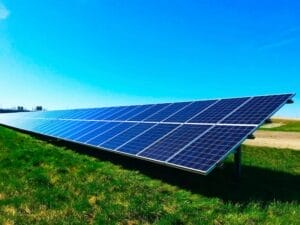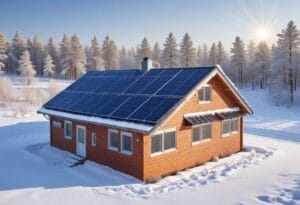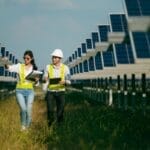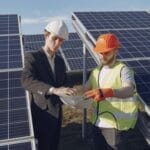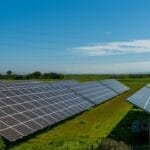Main Points
- Even when the weather is cloudy, solar panels can still generate power from diffused sunlight, making them effective.
- While the initial costs of solar installation can be high, long-term savings on energy bills and available incentives often offset these costs.
- The myth that solar panels require constant maintenance is debunked, as they actually require minimal maintenance.
- Modern solar panels have a long lifespan, typically around 25 to 30 years, making them a wise long-term investment.
- By combining solar power systems with battery storage, it’s possible to use solar energy even when the sun isn’t shining.
Solar Energy: Dispelling the Myths
We’re going to dive right in and start debunking some of the myths that have been casting a shadow on solar energy. There’s a lot of talk around this topic, and sometimes that talk can be misleading. You’ve probably heard things like “solar panels don’t work when it’s cloudy” or “they’re too expensive.” Well, it’s time to clear up the confusion.
Shedding Light on the Truth
Solar energy has evolved tremendously since its early days. Thanks to technological advancements, it’s now more efficient and available than ever. However, despite these strides, there are still many misconceptions. I’m here to give you the facts, plain and simple, so you can understand why solar energy is worth your attention.
Getting a Grip on Your Solar Energy Capabilities
Before we clear up some misconceptions, it’s essential to grasp what solar energy capabilities truly imply. It’s not merely about having numerous panels on your roof; it’s about utilizing the sun’s power in the most efficient way feasible. And with the technology available today, that’s something nearly all of us can accomplish, no matter where we reside.
Tips for the Budding Eco-Warrior
Thinking about going solar? You’re already ahead of the game. It’s a move towards a greener future, and it’s a choice that can also pad your wallet. As we debunk these myths, remember that going solar isn’t just about being green—it’s also about being financially savvy.
Separating Reality from Rumors
Are Solar Panels Ineffective on Overcast Days?
One of the most common misconceptions is that solar panels are ineffective on overcast days. This is completely false. Solar panels can utilize diffused sunlight to produce power, so they’re still functional even on cloudy days. Of course, they’re more efficient under direct sunlight, but they don’t simply cease to work when it’s cloudy.
Consider this: if you can see well enough to perform your daily tasks without needing to turn on every light in your home, there’s enough sunlight for your solar panels to produce power. It’s all about the UV rays, which have the ability to pass through clouds. So, even when the sky is overcast, your solar system is more than just a pricey roof decoration.
Can the Everyday Person Afford Solar Power?
Let’s address the elephant in the room: price. The initial cost of solar panels might make you gulp, but it’s only part of the picture. You need to think about the long-term reductions on your energy bills. Over time, these reductions can well and truly make up for the initial outlay. Plus, there are often incentives like tax credits and rebates available to help with the cost of installation.
Let’s put this into perspective with some figures. The initial outlay for a home solar system can be between $15,000 and $25,000, but federal tax credits and other incentives can reduce this by 30% or more. Factor in the average electricity bill savings and you could recoup your investment in just 7 to 8 years.
Are Solar Panels High Maintenance?
One common misconception is that solar panels are high maintenance. The truth is, they’re not. Once they’re installed, solar panels don’t require much attention. Usually, a routine cleaning to remove any debris or snow is all that’s needed to keep them operating at peak performance.
First and foremost, solar panels are made to be durable and weather resistant. They are designed to be tough enough to keep absorbing sunlight year after year with very little need for you to do anything. That is one of the great things about solar power, once it is set up, it requires very little day-to-day maintenance.
Dispelling the Shadows: The True Story of Solar Power
Solar power is often misunderstood, with myths and misconceptions casting a shadow over its true potential. It’s time to shine a light on the reality. Solar power isn’t a niche, unreliable technology; it’s a strong and rapidly growing industry that’s revolutionizing our approach to energy.
Most misconceptions about solar power come from old data or a basic lack of knowledge. However, with today’s advancements in technology and a heightened awareness of renewable energy’s importance in fighting climate change, we are more prepared than ever to utilize the power of the sun.
By addressing these misconceptions directly, we’ll see that solar power is not only an alternative, but often the preferred option for energy use, due to both its environmental advantages and its cost efficiency. So let’s correct the record and illuminate the true tale of solar power.
Dispelling the Cloudy Misunderstanding
Let’s get straight to one of the most common misunderstandings: solar panels stop working when it’s cloudy. This is not the case. Solar panels can still produce electricity on cloudy days, they just don’t produce as much as they do on bright, sunny days.
- Solar panels don’t need direct sunlight to work; they just need daylight.
- Clouds can actually spread sunlight out more evenly and decrease the heat on the panels, which can sometimes make them work better.
- Many countries with a lot of cloudy weather, like Germany and the UK, use a lot of solar energy.
It’s not about how much sunlight there is, but how good the technology is that catches and changes the sunlight that is there. So, while solar panels might work better on sunny days, they still work when it’s cloudy. To learn more about this, read about the common solar myths and misconceptions.
Today’s solar panels are so efficient that they can even use the light that makes its way through the clouds. They’re built to work in a variety of conditions, so even if it’s cloudy outside, you can still power your house in an environmentally friendly and cost-effective way.
Keep in mind that the aim of solar power is durability and strength, not just top performance under ideal circumstances. So, solar panels are a dependable part of our energy blend, whether it’s sunny or raining.
Unveiling the Real Expenses of Solar Investment
People often focus on the initial investment when considering solar power. Indeed, it’s true that installing solar panels comes with upfront costs. However, concentrating only on the initial cost doesn’t provide a complete view of the situation.
Let’s dissect the expenses and savings:
- Government incentives, rebates, and tax credits can help offset the cost of installation, significantly reducing the overall expense.
- Once solar panels are installed, they can dramatically lower monthly energy bills, often resulting in savings that can recoup the initial investment within a few years.
- Solar panels can boost property values, providing a return on investment if you choose to sell your home.
Over the lifespan of a solar panel system, which can be 25 to 30 years or longer, the savings can be considerable. For instance, if your solar panels decrease your electricity bill by $100 per month, over 30 years, that’s a savings of $36,000. And that doesn’t even factor in the increasing costs of electricity that you’ll be sidestepping.
Debunking Maintenance Myths: A Deeper Dive
The misconception that solar panels need continual upkeep is another fog that needs clearing. The truth is, solar panels are robust and built to endure the weather, from blistering heat to icy snow.
Here’s the scoop on solar panel upkeep:
Solar panels require very little maintenance once they are installed. Usually, all you need to do is clean them occasionally to remove dust, leaves, or snow. In many places, the rain will even do this for you. Because solar panels don’t have any moving parts, they are less likely to break and need to be repaired. Most solar panel systems also come with warranties that last 20 to 25 years, so you can feel secure in your investment.
Instead of viewing solar panels as fragile and high-maintenance, recognize them for what they truly are: robust, dependable, and low-maintenance power producers that can stand up to the test of time and weather.
Understanding the lasting monetary gains that come with installing solar panels is essential. These gains are not confined to saving on energy costs but also include a range of financial incentives intended to promote the use of green energy.
Understanding Incentives and Tax Breaks
Government and utility companies frequently provide a variety of incentives to make solar energy more affordable. These incentives can significantly lower the initial cost of solar panels and can include tax credits, rebates, and even grants. It’s worth your time to look into what incentives are available in your area, as they can greatly improve the affordability of solar energy.
Questions and Answers
You have questions, and it’s crucial to receive simple, direct responses. Here are some typical questions that you might be pondering.
Do Solar Panels Work in Winter?
It’s a common question: Are solar panels a smart choice in areas with harsh winters? The answer is yes. Solar panels can be just as efficient in the winter as they are in the summer. In fact, the cooler temperatures can actually enhance solar panel efficiency. The most important factor is the amount of sunlight, not the temperature.
- Solar panels are more efficient at converting sunlight to electricity in cooler temperatures.
- Snow can reflect light and enhance performance when it’s not covering the panels.
- Correct installation guarantees that most snow will slide off the panels, minimizing any effect on efficiency.
So, don’t let winter get in the way of your solar energy ambitions. With the right equipment, you can reap the benefits of solar power all year round.
Is it Possible to Install Solar Panels on a Rented Property?
As a tenant, you might believe that solar panels are not an option for you, but that’s not necessarily true. Solar panels can be installed on a rented property with the consent of the landlord. Some landlords might even welcome the idea, particularly if it enhances the value and attractiveness of the property. The key is to have a discussion and arrive at an agreement that benefits both parties.
Do Solar Panels Cause Environmental Damage?
Although the production of solar panels does consume energy and materials, the total environmental footprint is much smaller than that of fossil fuels. Once they are operational, solar panels generate green, renewable energy for many years, which greatly lowers the emission of greenhouse gases.
Think about it: Solar panels can offset emissions equivalent to planting tens of thousands of trees over their lifetime. That’s a forest of benefits right there.
Can You Go Completely Off the Grid with Solar Power?
Yes, you can go completely off the grid with solar power, particularly if you pair your solar panel system with battery storage. This setup allows you to store excess energy for use when the sun isn’t shining. However, going off the grid requires careful planning and investment, as you’ll need to ensure your system can meet all your energy needs.
What Occurs if My Solar Panels Generate More Power Than I Consume?
If your solar panels generate more power than you consume, the surplus can typically be returned to the grid. Numerous utilities provide net metering programs that give you credit for this surplus power, which can help to reduce the cost of electricity you pull from the grid at other times.
So, solar energy is a brilliant concept that’s often clouded by myths. Once you have the facts, you’ll see that solar panels are a practical, affordable, and eco-friendly choice for power generation. They function in a range of weather conditions, need little upkeep, and provide long-term savings that make the initial outlay a good investment. So, if you’re seeking a wise energy decision, look to the sky—the sun is beaming down on a solar solution that’s waiting for you.
